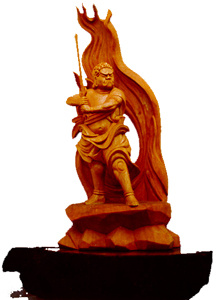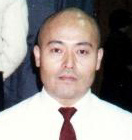Martial Arts Maxims
Martial Arts Maxims
1. Shu Ha Ri.
Shu. Observe the old without straying. The student directly studies the teacher's way.
Ha. Break strict observation and adapt different teachings. This is the stage of experimentation and research.
Ri. Leave, advancing beyond both former stages. The student goes beyond the teachings to develop a style within a style. This does not mean a new style is created; rather, that the student now places a new emphasis on his favorite teachings. Not new; however, view and perhaps taught from a new perspective. This new/old perspective is an enlightenment to the student.
2. Shin Sho Ken Choku.
Correct your heart in order to correct your sword.
3. Shin Ken Hyaku Ja Futsu.
Eliminate all evils through god's sword
or
With a real (god's) sword, dispel self-evil.
4. Hyaku Ren Ji Toku.
Severe training brings self-attainment. This is Nakamura Taizaburo sensei's favorite maxim. Literally it means 100 trainings, self-attainment. After severe training 100 times (100 is equivalent to meaning infinity) you will receive attainment (understanding or enlightenment) by yourself.
7. Nippon To Hito ni Kirarezu Hito Kirazu Jiko no Renma ni Shugyo no Michi.
The Japanese sword: not being killed by others, not killing others; cultivating self via severe training. This is the Way of discipline. This is a Japanese poem by Nakamura sensei.
8. Shin Gi Tai.
Spirit, Technique, Body. The three inseparable entities which create the whole martial artists. If one element is de-emphasized in the least, the true martial artist becomes unbalanced.
9. Shin Gyo.
Action of the heart. Do things through the heart.
10. Hei Jo Shin.
Normal state of mind. Maintain one's state of mind or composure without being affected by the environment. Unaffected spirit.
11. Hei Jo Shin no Michi.
The Way of the composed mind.
12. Rei Gi Shin Chi Jin.
Courtesy, Obligation, Belief, Knowledge, Virtue. These are called the Go Jo, or Five Ordinaries (Confucian) and are considered the beginning of budo (budo no hajime). Without these five Confucian ethics the martial arts devolve into brutish brawling.

13. Fudo Shin.
Immovable Spirit. Unaffected spirit (heijo shin). Fudo Myo-o is one of the protector gods within the Buddhist panoply, so the translation could also be to have the spirit of Fudo Myo-o. Fudo Myo-o waits at the gate of hell to assist those who have strayed from the path -- he assists them with the rope of truth and his sword cuts through delusion to help those in need of enlightenment.
14. Sen Shin.
Clean the mind/spirit. In Japanese shin means heart; however, heart is translated as mind or spirit and should not be confused with the physiological heart (shinzo). Heart/mind/mentality should not be thought of three separate ideas, but one all-encompassing thought.
15. Katsu Jin Ken Satsu Jin Ken.
The life-giving sword; the life-taking sword. This is the sword that is used righteously to vanquish evil, either physically or spiritually. Do not use the sword improperly, with evil intent. In Japanese satsujin actually means murder. Wield the life-giving sword, not the murdering sword.

